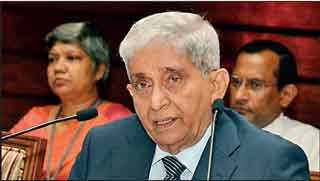Sunday Dec 07, 2025
Sunday Dec 07, 2025
Friday, 6 March 2020 00:28 - - {{hitsCtrl.values.hits}}
By Uditha Jayasinghe
As Sri Lanka braces for the impact of novel coronavirus COVID-19, the Central Bank yesterday said it has adjusted growth to a margin of 3.5-4% from an earlier 3.7-4.5% projection, and called on banks to transfer benefits from the last round of rate cuts to businesses faster, to counter the virus’s impact, which could be felt on a range of sectors.
 |
Central Bank Governor
|
The Monetary Board decided to keep policy rates unchanged when they met on Wednesday, partly due to a 50 basis point reduction in January, which is still filtering to markets. However, Central Bank officials acknowledged they were concerned about the impact of COVID-19, which could impact imports, exports, tourism, remittances, and the return of Chinese workers to the country. In 2019, 18% of consumer goods imports, 16% of intermediate goods imports, and 33% of investment goods imports originated from China.
It also observed that the spread of the virus to countries such as South Korea and Italy could have some downward effect on remittance inflows as well.
In 2019, 3% of total foreign employment migration was to South Korea and Italy, moreover, further spread in the Middle East could have a severe impact on remittances.
The Central Bank also said it will await directives from the Government on whether additional support may be given to apparel and other affected industries. Banks have received about 11,000 applications under the Small and Medium Enterprise (SME) moratorium, with 6500 coming from customers with valid loans, and the rest from non-performing loans. The banks will continue processing applications till the end of 31 March. The non-performing loan ratio of commercial banks remained at 4.9% in January.
“We urge commercial banks to pass the benefit of our policy rate reduction to the borrowers without any further delay. At the same time, the Monetary Board extended an assurance to the market that adequate liquidity in domestic financial markets will be maintained to weather any impact arising from global developments, particularly due to the spread of the coronavirus. We have observed policymakers in many economies respond to the rapid spread of the virus, and it is expected that these accommodative measures continue until the global economy shows clear signs of recovery,” Central Bank Governor Prof. W. D. Lakshman told reporters.
He acknowledged that Sri Lanka could face a difficult situation due to COVID-19, but declined to give specific details on how much growth may reduce, and contended that the stimulus given by the Government, the moratorium, and the reduction in interest rates was sufficient to see stronger growth in 2020 when compared to last year.
“The ongoing developments will have an adverse effect on Sri Lanka as well, but we still expect the Sri Lankan economy to do better in 2020 than last year, and record a growth rate between 3.5%-4%. The expected political stability after the elections and the presentation of the Budget will boost investor confidence further. The current fiscal support and declining market interest rates are expected to compensate for the possible reduction of external demand to a great extent.”
The Governor acknowledged rising inflation has overshot projections, but as it is driven largely by food inflation, he hoped the numbers will reduce over the next few weeks, and return to the 4-6% target range, stabilising thereafter. He pointed out the exchange rate has shown greater stability and reserves had grown to $ 7.9 billion in February.
Year-on-year growth of credit to the private sector, which started to show some recovery in December 2019 with a growth of 4.3% (revised), marginally increased to 4.5% in January 2020. With the ongoing pass-through of policy measures to market lending rates and improving business confidence, the growth of credit to the private sector is expected to accelerate further, the Central Bank observed.
Driven by the domestic credit expansion, broad money growth (year-on-year) also accelerated in to 8.3% (year-on-year) in January 2020 from 7.0% in December 2019.
“Private sector credit growth is expected to continue its upward trend, particularly with declining lending rates. We expect further reduction in lending rates. Possible fiscal slippage was also discussed and we observed the expected net financing requirements in 2020 is unlikely to add any excessive pressure to the market.”
According to the Central Bank’s projections, private sector credit could grow by about 12%-14% this year, provided there is 4% growth and inflation is maintained at about 5%, Senior Deputy Governor Dr. Nandalal Weerasinghe said.
“We will have to see import figures from March onwards; it is too early for us to give projections. There is a lot of evidence to suggest raw materials will be delayed from China, and that will impact industries, but we do not yet know to what extent Sri Lanka will be affected, specifically. What we are looking at is coronavirus impact on aggregate demand; in Sri Lanka aggregate demand is mainly larger components of domestic demand. This is one of the reasons why we will not react to coronavirus like some of the other countries, which are highly trade dependent as well as have portfolio impact. In our case, we are not very exposed in these aspects,” he noted, explaining the Central Bank’s decision to keep rates unchanged.
